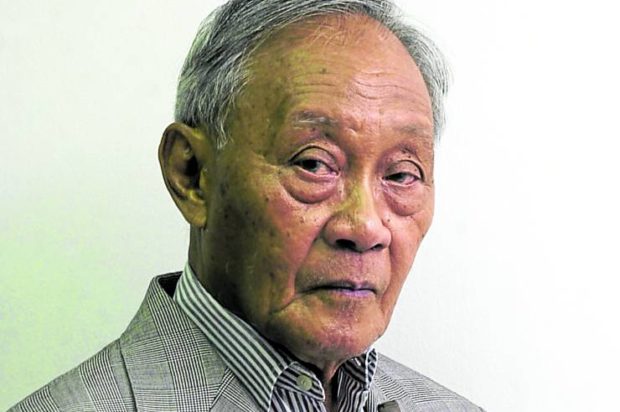MANILA, Philippines — For at least three generations of Filipino journalists, former Inquirer columnist Amando “Doro” Doronila set the standards for Philippine journalism.
A lifelong writer and critic, he “not only wrote and witnessed history, but also made history,” according to veteran journalist Ed Lingao.
But behind his illustrious body of work which are now part of the nation’s stories, Doronila is also an ordinary citizen whose life has been molded by political and social forces that shaped the nation.
On his 95th birthday on Monday, he launched his second volume of memoirs titled “Doro: Behind The Byline,” which featured his insights into his upbringing, his early days as an investigative reporter and his time as a political detainee under former President Ferdinand Marcos Sr.
Not first choice
The book launching was held at the Australian National University (ANU), an event facilitated by his children, Maria-Lourdes and Augustine Doronila.
Much of Doronila’s book covered his early days as an investigative reporter—not his original career choice as he almost took over the management of their family bakery in Dumangas.
It was his appointment as editor in chief of the University of the East’s school publication, “The Dawn,” however, that set him on a different career path.
The book also chronicled the “dramatic events” in the lead-up to martial law, during which Doro was imprisoned alongside other journalists who were critical of Marcos Sr., said Paul Hutchcroft, ANU Southeast Asian politics scholar.
Exile in Australia
Even before martial law, Doronila “made his mark on Marcos himself,” noted Lingao. In 1971, a year before he imposed martial law across the Philippines, Marcos wrote in his diary that “such people like Amando Doronila believe I am not the man who can be the benevolent dictator.”
Doronila dedicated an entire chapter to his detention and subsequent exile to Australia, which he described as “The Long Night.” He returned to the country in 1985, wanting to cover the eventual downfall of the Marcoses—only to witness the return of his son to Malacañang nearly 40 years later.
Sociologist and professor Nicole Curato noted that this “loss of confidence” in the Filipino people was a “common theme” in Doronila’s memoir. In the epilogue, she noted that the journalist had “confessed to taking a dim view of democracy’s survival amidst the threats it faces today.”
But his book, she added, “reminds us of what exactly is expected from Filipinos recovering from a political heartbreak. What is expected from Filipinos — especially from journalists and academics — is to keep doing our work and to do it well.”
Moment of clarity
Curato noted that at one point in the book, Doro shared how he coped with the deteriorating democracy in the Philippines: by studying for a master’s degree in politics at Monash University because he “wanted to keep my mind busy rather than brood while waiting for the restoration of democracy in the Philippines.”
“As an academic, this line prompted another moment of clarity. We need to keep our minds busy because the greatest gift we can give Doro is to prove his dim view of the future wrong—that the nation who invented People Power will, once again, have the will to exercise it again,” she said.
Ultimately, Lingao said, Doronila’s memoir was a lesson to appreciate history and to have a “strong sense of responsibility” for the nation, “because what Doro called a long night has not yet come to an end.”
